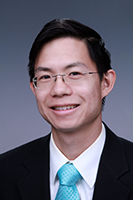 Speaker: Yeung Enoch, Research Scientist at Pacific Northwest National Laboratory
Speaker: Yeung Enoch, Research Scientist at Pacific Northwest National Laboratory
Title: Using Deep Learning to Discover Koopman Operators
Abstract: Traditional learning problems integrate domain knowledge in one of two ways: incorporating a model class or structure on the learned representation or imposing structure as part of a representation learning algorithm. The ideal is to find a model structure that can be efficiently represented and simultaneously identifiable. In certain data science applications, where lack of domain knowledge precludes specification of model class or structure, a tradeoff emerges between generic representations and efficient representations. In this talk I will review the classic problem of learning Koopman operators. I will discuss how recent results using deep learning enable discovery of Koopman dictionaries that are sufficiently generic, yet efficient at approximating Koopman operator dynamics. Examining the functional structure of Koopman dictionaries obtained from deep learning, we discover a class of dictionary functions that enjoy mathematically nice properties for a specific class of learning approximation problems. We illustrate the advantages and limitations of deep Koopman operator learning on natural and synthetic biological networks, power networks, and classical nonlinear dynamical systems.
Bio: Dr. Enoch Yeung is a research scientist at Pacific Northwest National Laboratories. He received a B.S. in Mathematics from Brigham Young University, magna cum laude with University Honors and a Ph.D. in Control and Dynamical Systems from the California Institute of Technology. His research interests are centered in learning algorithms, algorithms for network estimation and design and model reduction for stochastic and nonlinear systems, with applications to biology and critical infrastructure. His most recent work has focused on reverse-engineering genetic context effects in synthetic biocircuits, developing algorithms for network verification of synthetic biological networks, developing synthetic biosensors in living prokaryotes for performing temporal logic, and paper-based synthetic biosensing solutions for mobile devices. His latest work was showcased at the 2016 DARPA Wait, What? Technology Forum. He is the recipient of a National Defense Science and Engineering Graduate Fellowship, National Science Foundation Graduate Fellowship, an ACC Best Presentation Session Award, and a Charles Lee Powell Foundation Fellowship. He has lead several research projects under the DARPA Synergistic Discovery and Design program, the High Performance Data Analytics program, the NSF Molecular Programming Project, and an AFOSR Biological Research Initiative.